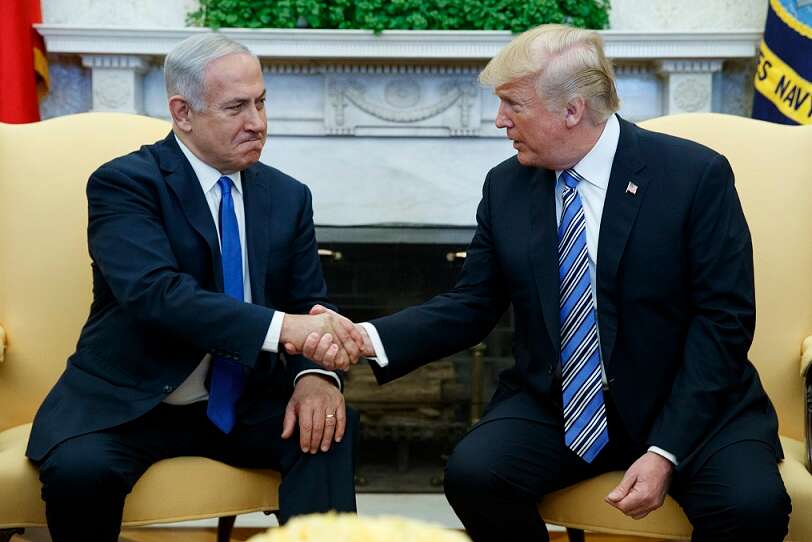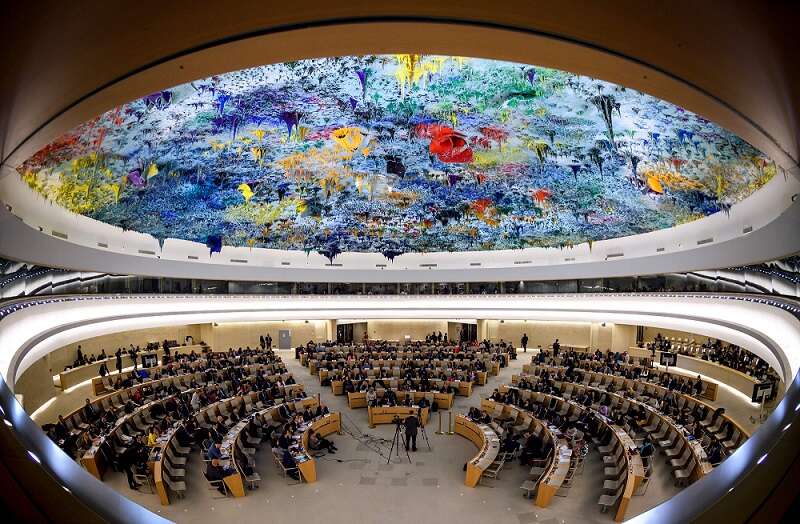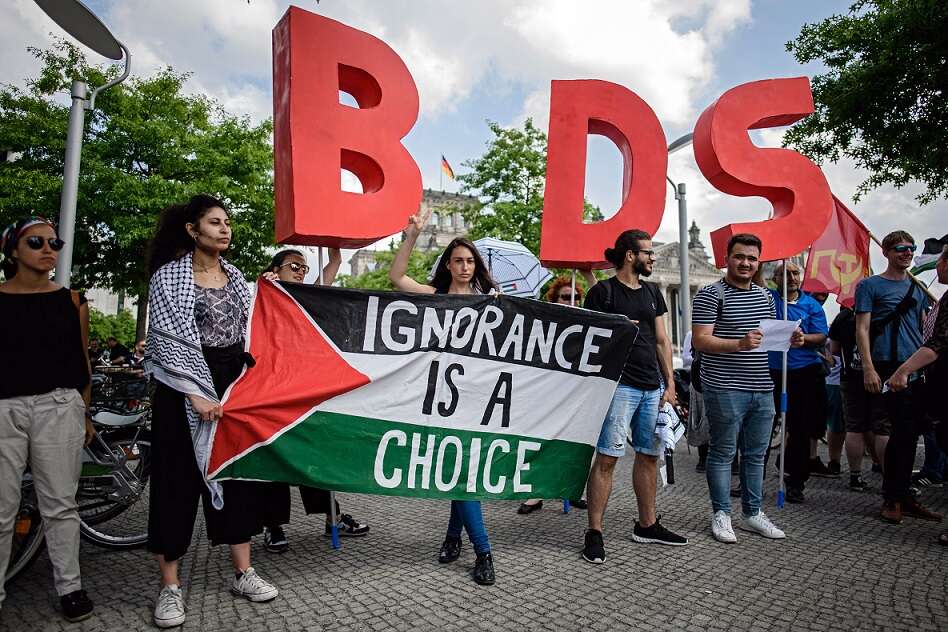Following the release of the United Nations "blacklist" – of more than 100 companies across the globe it said are complicit in violating Palestinian human rights by operating in Israeli communities in Judea and Samaria – the Foreign Ministry instructed Israeli consulates in the United States on Wednesday night to reach out to respective governors of states in which the companies mentioned in the UN report are headquartered, and ask them to denounce the initiative.
The blacklist, issued by the UN human rights office, includes companies such as AirBnb, which is based in Florida, and California-based Expedia. As a reminder, in recent years 28 US states have passed laws outlawing BDS activity. Therefore, from a legal perspective, the companies operating out of these states are not permitted to alter their policies because of the report.
Follow Israel Hayom on Facebook and Twitter
In a statement, Netanyahu slammed the council as "unimportant" and vowed to fight the database.
"Instead of the organization dealing with human rights, it only tries to disparage Israel. We strongly reject this contemptible effort," he said.
Netanyahu made clear he considered the US government's position on settlements under President Donald Trump as more important than the views of UN organizations.
"We will ensure the [administration's] recognition of our sovereignty over those settlements – that will cancel out the entire impact of the United Nations because the United States is more important than the UN," he told Army Radio.

"Whoever boycotts us will be boycotted. The UN Human Rights Council is a biased body that is devoid of influence," he said.
"Not for nothing have I already ordered the severing of ties with it. It was also not for nothing that the American administration has taken this step together with us," he added, referring to the Trump administration's June 2018 decision to leave the council, citing its "chronic bias against Israel."
Israel has never been a member of the council, which is made up of 47 governments. It includes countries like Libya, Venezuela, Eritrea, Nigeria, Angola and Somalia among its members, in addition to Bahrain, Sudan, Qatar, Pakistan and Afghanistan. Among the European countries on the council are Germany, Austria, Spain and Italy. The overwhelming majority of resolutions passed by the council has focused on Israel and its treatment of Palestinians, and Israel is the only country in the world whose policies automatically face scrutiny at every council session.
"In recent years, we have promoted laws in most US states, which determine that strong action is to be taken against whoever tries to boycott Israel. Therefore, this body is unimportant," Netanyahu went on.
Foreign Minister Yisrael Katz called the report a "shameful capitulation" to anti-Israel groups and in conjunction with Netanyahu's directive ordered his ministry to freeze relations with the UNHRC, which he accused of serving the boycott, sanctions and divestment movement. Katz said the measure was enacted to protect companies operating in Israel.
Other companies on the blacklist include consumer food maker General Mills, tech and communications giants Motorola Solutions and Altice Europe, and infrastructure companies like France's Egis and Alstom, and British company JC Bamford Excavators. It also included travel firms Airbnb and Expedia, as stated, along with TripAdvisor, Booking.com and Opodo.

"I am conscious this issue has been, and will continue to be, highly contentious," said Michelle Bachelet, the UN High Commissioner for Human Rights. "However, after an extensive and meticulous review process, we are satisfied this fact-based report reflects the serious consideration that has been given to this unprecedented and highly complex mandate."
Businesses may ask to be delisted if they can prove that they no longer provide material support to Israeli settlements, Bachelet's office said. The list will be updated annually.
UN Human Rights Office issues a report on business enterprises involved in certain activities relating to the Israeli settlements in the Occupied Palestinian Territory, in response to a specific request by @UN_HRC. Learn more: https://t.co/qDVrtFZKwV
— UN Human Rights (@UNHumanRights) February 12, 2020
The Human Rights Council in 2016 instructed the UN's human rights office to create a "database" of companies deemed to be linked to or supportive of Israeli communities in Judea and Samaria. Beginning with a potential list of over 300 companies, it narrowed it down to 112 firms "it has reasonable grounds to conclude have ties with Israeli settlements" and are involved in practices that raised human rights concerns, such as settlement construction, security services, banking and equipment that was used to demolish Palestinian property.
In a statement, the human rights office said 94 of these companies were domiciled in Israel – including all major banks, state-owned transportation companies Egged and Israel Railways Corporation, and telecommunications giants Bezeq, HOT and Cellcom. It also lists medium-size companies such as restaurant chain Café Café and Angel Bakeries.

Of the 18 that are foreign, six are based in the US, four in the Netherlands, three in the UK, three in France, and one each in Luxembourg and Thailand.
President Reuven Rivlin responded by reading out a long list of Israeli companies mentioned on the list and encouraging Israelis to support them.
"I am proud that these are Israeli businesses, patriots who contribute to Israeli society, to the economy and peace. Although we do not promote private businesses here in this house, when Israeli businesses are under the threat of boycott, we will stand with them," he said during an event at his official Jerusalem residence.
"Boycotting Israeli companies does not advance the cause of peace and does not build confidence between the sides. We call on our friends around the world to speak out against this shameful initiative which reminds us of dark periods in our history," he said.
Palestinian Authority Foreign Minister Riyad Al-Maliki welcomed the report as a "victory for international law" and urged UN member states to issue instructions to the companies listed "to end their work immediately with the settlement system."
Anne Herzberg, the legal adviser for NGO Monitor, an Israeli advocacy group that scrutinizes the UN, said: "The UN Office for the High Commissioner for Human Rights has officially decided to endorse anti-Semitic BDS by issuing a defamatory list of companies it claims are supposedly involved in 'settlement activity.'"

The BDS movement called for action against the companies. "These companies must be held to account, including through strategic boycotts and divestment campaigns," it said.
Shai Alon, the head of the Beit El Regional Council in Judea and Samaria and a member of the Yesha Council, said the UN on Wednesday "published its selection of Jews, just like in the Second World War."
He added: "It is disgraceful and disgusting, a pock of shame on an organization that is entirely pro-Palestinian, which on one hand turns a blind eye and doesn't raise a finger when it comes to the genocide in Syria and the murder of women in Saudi Arabia, and on the other harms the fragile fabric of life here in Israel. The first to be hurt by this selection are the Palestinians who earn a living from Jewish businesses here in Judea and Samaria. If the economy in Judea and Samaria falls, hundreds of thousands of Palestinians will go home without paychecks."
Economy Minister Eli Cohen said the blacklist could leave "thousands of Palestinians unemployed," accusing the Geneva-based council of "modern anti-Semitism."
Blue and White leader Benny Gantz also decried the database. "This is a dark day for human rights. The UN Human Rights Council has lost touch with reality," he said.




